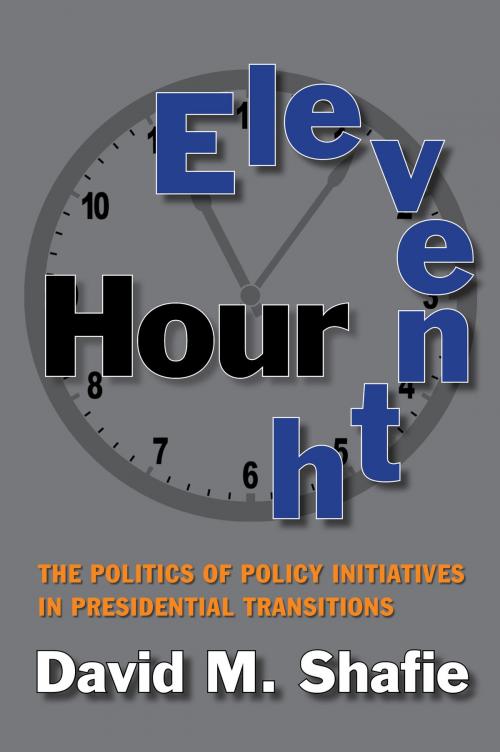Eleventh Hour
The Politics of Policy Initiatives in Presidential Transitions
Nonfiction, Social & Cultural Studies, Political Science, Politics, Practical Politics, Government| Author: | David M. Shafie | ISBN: | 9781623490041 |
| Publisher: | Texas A&M University Press | Publication: | September 1, 2013 |
| Imprint: | Texas A&M University Press | Language: | English |
| Author: | David M. Shafie |
| ISBN: | 9781623490041 |
| Publisher: | Texas A&M University Press |
| Publication: | September 1, 2013 |
| Imprint: | Texas A&M University Press |
| Language: | English |
Pres. Jimmy Carter issued last-minute rules immediately before leaving the White House, creating frustration for the incoming Reagan Administration. As George W. Bush prepared to cede the Oval Office to Barack Obama almost three decades later, he ordered more than thirty last-minute policy changes, quickly finalizing the rules before the Obama Administration could overturn them.
Presidents are able to bypass Congress and quietly initiate significant policy changes by using the executive branch’s authority to alter existing statutes. In Eleventh Hour: The Politics of Policy Initiatives in Presidential Transitions, David M. Shafie analyzes how and why five successive presidents have done so at the end of their administrations, offering important new insights for the growing study of the administrative presidency.
After assessing transcripts of speeches and staff communications, such as memos from the White House Domestic Policy offices, memos from selected regulatory agencies and the Office of Management and Budget, as well as records in the Clinton, Reagan, George (H. W.) Bush, and Carter Presidential Libraries, Shafie also conducted in-depth interviews with administration personnel charged with formulating and implementing the executive rule changes. Based on his research, Shafie explains end-of-term rulemaking as an instrument of presidential prerogative power by mapping its evolution through five recent presidential transitions and exploring its effectiveness, consequences, and implications.
Giving consideration to recent efforts to limit interregnum rulemaking and to overturn specific late-term rules, as well as evaluating the prospects for future presidents to favor this instrument to advance their unfinished domestic policy priorities, Eleventh Hour offers groundbreaking research into the uses of executive power.
Pres. Jimmy Carter issued last-minute rules immediately before leaving the White House, creating frustration for the incoming Reagan Administration. As George W. Bush prepared to cede the Oval Office to Barack Obama almost three decades later, he ordered more than thirty last-minute policy changes, quickly finalizing the rules before the Obama Administration could overturn them.
Presidents are able to bypass Congress and quietly initiate significant policy changes by using the executive branch’s authority to alter existing statutes. In Eleventh Hour: The Politics of Policy Initiatives in Presidential Transitions, David M. Shafie analyzes how and why five successive presidents have done so at the end of their administrations, offering important new insights for the growing study of the administrative presidency.
After assessing transcripts of speeches and staff communications, such as memos from the White House Domestic Policy offices, memos from selected regulatory agencies and the Office of Management and Budget, as well as records in the Clinton, Reagan, George (H. W.) Bush, and Carter Presidential Libraries, Shafie also conducted in-depth interviews with administration personnel charged with formulating and implementing the executive rule changes. Based on his research, Shafie explains end-of-term rulemaking as an instrument of presidential prerogative power by mapping its evolution through five recent presidential transitions and exploring its effectiveness, consequences, and implications.
Giving consideration to recent efforts to limit interregnum rulemaking and to overturn specific late-term rules, as well as evaluating the prospects for future presidents to favor this instrument to advance their unfinished domestic policy priorities, Eleventh Hour offers groundbreaking research into the uses of executive power.















